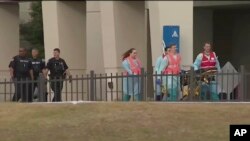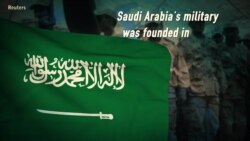The deadly shooting by a Saudi national last week at the Naval Air Station Pensacola in Florida has raised questions about radicalization in Saudi Arabia’s military ranks.
Mohammed Alshamrani, 21, a lieutenant in the Royal Saudi Air Force, opened fire in a classroom at the naval base, killing three U.S. sailors and wounding eight others before he was killed by police.
Alshamrani had reportedly shown signs of radicalization and embraced extremist ideology as early as 2016.
Vetting process
If reports about Alshamrani’s early radicalization are true, "then it raises more questions over what is the vetting process," said Colin Clarke, a senior research fellow at the Soufan Center in New York.
"Clearly it is not effective enough, because this person would have been identified as someone who was making extremist remarks or holding religiously radical viewpoints," Clarke told VOA.
Considered a major U.S. ally in the Middle East, Saudi Arabia has been sending students to the United States for military training for decades.
According to the U.S. State Department, more than 5,500 temporary visas were issued to Saudi military personnel in 2019 alone. As of last week, 852 Saudi nationals were in the U.S. for Pentagon-sponsored training on security cooperation, The Washington Post reported.
In response to the Friday attack, the Pentagon has suspended nonclassroom training for all Saudi Arabian military students presently in the U.S.
U.S. defense officials also have ordered a review of the vetting process for all international students enrolled at U.S. military facilities.
Experts charge that moving forward, the vetting process for international military trainees should be more comprehensive to ensure that prospective students aren’t radicalized and don’t have ties with terror groups.
"Vetting might have to extend to a close examination of individuals’ social media accounts," analyst Clarke said.
Anti-Americanism
Saudi Arabia is a major recipient of U.S. military aid and assistance. Riyadh is the top buyer of U.S. weapons. Between 2013 and 2017, Saudi Arabia's purchases accounted for nearly 18% of all U.S. arms sales, or about $9 billion, according to the Stockholm International Peace Research Institute.
But despite this close security cooperation, some experts, such as F. Gregory Gause, a professor of international affairs at Texas A&M University who monitors developments in Saudi Arabia, think there is an anti-American sentiment among many Saudi military personnel.
"I would assume that some amount of anti-Americanism is widespread in the Saudi military, as it is in Saudi public opinion and Arab public opinion generally," he said.
Gause told VOA, "The more important question on this particular issue is not anti-Americanism, but radicalization into jihadist beliefs."
"Saudi government has, since the mid-2000s, been very careful to try to stamp it out at home, through a combination of repression and changed rhetoric," he added.
Religiosity, not extremism
While some experts admit that religiosity exists among many Saudi military personnel, they maintain that it is not necessarily linked to extremist ideology.
"There is a level of religiosity in the Saudi military because it is part of the Saudi society, which is already religious," said Abdullah Ghadwi, a journalist at the Okaz newspaper in Riyadh.
"However, this does not mean that extremism exists in the Saudi military," he told VOA. However, "the Florida incident is a unique case."
The Florida shooter was one of the remnants of "jihadist movements that the Saudi authorities are working to eradicate," Ghadwi noted.
Wahhabism
Saudi Arabia is the birthplace of Wahhabism, a strict Sunni doctrine credited with inspiring the radical ideology of the Islamic State terror group.
Analyst Clarke said, "Saudi Arabia is the number one exporter of religious extremism and radical ideology across the world, and every now and then it comes back to bite them or another country, in this case it is the United States."
He said thousands of Saudi nationals have traveled to conflict zones to become foreign fighters with terrorist groups.
But in its 2018 Country Reports on Terrorism, released in November, the State Department said, "Saudi Arabia continued to enact domestic religious sector reforms, including the development of more stringent guidance and approval for Saudi religious personnel traveling overseas to conduct proselytization."
"As part of what Saudi Arabia describes as its ‘moderate Islam’ initiative, Saudi clerics and religious attachés sent abroad were vetted for observance to principles of tolerance and peaceful coexistence and were forbidden from undertaking proselytization efforts beyond host country Sunni Muslim communities," the report added.
Continued cooperation
Ghadwi, the Okaz newspaper journalist, said the Pensacola attack could be a way to raise the level of security and counterterrorism cooperation between Washington and Riyadh.
"Most likely the Florida shooting incident won’t affect the course of security cooperation between the U.S. and Saudi Arabia, rather it increases it," he said.
"Saudi Arabia is affected by this extremist ideology like the United States, and therefore the two parties will continue to eradicate it," Ghadwi added.






